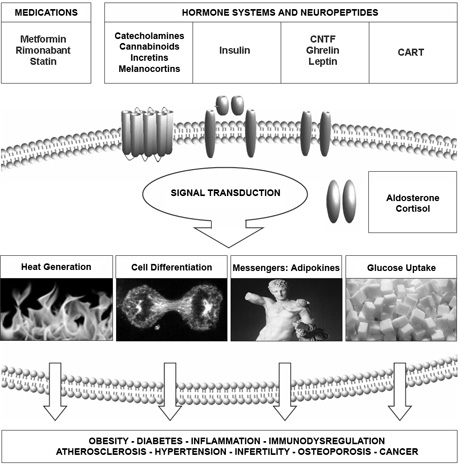|
Multi-System Interactions With Fat Cell Function
Disorders like insulin resistance, obesity, hypertension, and dyslipidaemia constitute the main risk factor for diabetes and cardiovascular mortality. These disorders are commonly considered to be a consequence of a dysregulated energy homeostasis. Since the discovery of the fat cell hormone leptin, it has become evident that energy balance is controlled by complex interconnections between the central nervous system and peripheral organs. The biology of adipose tissue is an essential component in this regulatory network. Adipocyte-selective impairment of intracellular signal transduction can result in significant systemic disease and even affect life expectancy.
In this context, our group has revealed direct interactions of important hormone and neuropeptide systems with fat cell functions on key metabolic and endocrine levels.
Please click on the hormone and substance names in the figure for further
information.

Newly identified fat cell-derived hormones contribute to the control of many physiological systems. For example, they regulate the immune system, haemostasis, salt-water-balance, vascular and endothelial function, insulin sensitivity, and energy homeostasis. Under special experimental and clinical circumstances, administration of these adipokines as well as modulation of fat cell function has already successfully been tested to treat a variety of metabolic disorders. The projects of our group aim at identifying important physiological regulators of fat cell biology and mapping their impact on key functions. The analysis of the mechanisms of action employed may yield new therapeutic options to prevent and treat a broad range of endocrine diseases and associated
disorders.
|
|